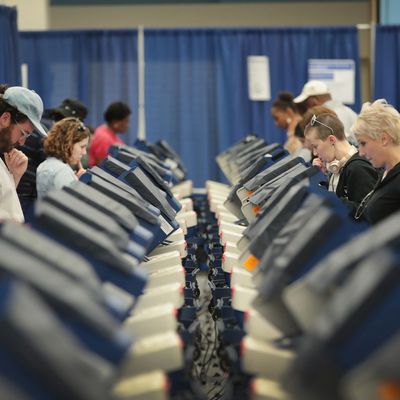
Everyone in politics understands the importance these days of early voting, both as a leading indicator of where things might wind up on Election Night, and as a strategic opportunity for campaigns to “bank” votes before the big get-out-the-vote operations of Election Day. In 2012, 31.6 percent of the national vote was cast early (by absentee or other mail balloting and in-person early voting).
It is not that easy, of course, to figure out who is “winning” early voting, but there are estimates, particularly for absentee-ballot requests in states with party registration, and for all kinds of early voting in states required under the Voting Rights Act to report ballots asked for or cast by race. (The comprehensive numbers we do have can be found at Michael McDonald’s United States Election Project site.)
The Washington Post’s Philip Bump, however, offers an analysis of the four million early votes already cast that sounds like very good if tentative news for Democrats:
Catalist, a voter data firm that works mostly with Democratic campaigns, provided The Washington Post with early vote numbers from several battleground states that allowed us to compare current returns with the number of ballots returned in years past. In seven states for which returned ballot data was available by party, Democratic ballots made up a larger percentage of what had come back by the 20-day mark (that is, by 20 days before Election Day) than in 2012 (or in 2008 for Florida). In some cases, like Arizona and North Carolina, the shift to the Democrats was substantial.
The apples-to-apples comparison to earlier elections is important because certain types of early voting usually favor Republicans (absentee voting) while others (in-person voting) tend to favor Democrats. The trends Bump discusses are not just important to the presidential contest, of course. Four of the seven states he is talking (Arizona, Florida, Nevada, and North Carolina) are holding competitive Senate races as well.
This could be one of those areas of electioneering where the “best practices” are being improved upon while most of us sleep (literally and figuratively), leaving one party or another to play catch-up.






























